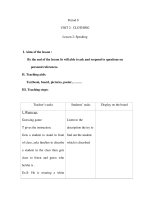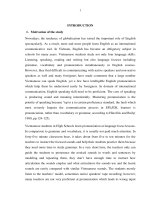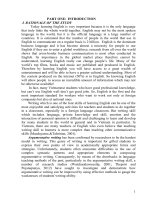Writing task 2 8.5 9889 graphic descriptions of crime
Bạn đang xem bản rút gọn của tài liệu. Xem và tải ngay bản đầy đủ của tài liệu tại đây (211.09 KB, 8 trang )
Overall band score
8.5
9+8+8+9
See below C&C LR GRA
Model answer
WRITING TASK 2
You should spend about 40 minutes on this task.
Write about the following topic:
Some people think that the detailed criminal description on newspapers and TV
has bad influences, so this kind of information should be restricted in the media.
Do you agree or disagree with this statement?
Give reasons for your answer and include any relevant examples from your own
knowledge or experience.
Write at least 250 words.
Original answer There has been a trend towards publishing criminal cases in detail in recent years.
Many people, myself included, however, believe that the government should
exercise restrictions on this kind of reporting. This essay will shed light on my
belief by demonstrating various negative ramifications of publishing detailed
descriptions of crimes.
The first consequence is that describing criminal cases in detail can take a toll on
the victims and their families. The case of a Vietnamese 9-year-old girl who was
sexually assaulted by her teacher at a primary school in 2020 perfectly exemplifies
this point. After the allegations came to light, the media began reporting on the
case, including details of the assault and the identity of the perpetrator and
victim. Nevertheless, according to the child's parents, the reporting had
revictimized the girl and increased her trauma, throwing her into deep depression
and impeding her recovery.
In addition to causing additional harm to the people involved, detailed
descriptions of criminal cases in the media could also interfere with law
enforcement’s ability to gather evidence, especially in cases where information is
leaked prematurely. This could impede the process of bringing perpetrators to
justice. Worse still, detailed information about a crime can cause prejudice and
bias against the suspect or accused, even before they have had a fair trial. This
could potentially undermine the ability of the accused to receive fair judgements,
hence wrongful convictions or the persecution of innocent individuals.
To summarize, for the aforementioned potential consequences, I would argue
that the government should restrict media outlets from reporting on criminal
cases in detail, especially sensitive ones.
Overall band score
8.5
9+8+8+9
TR – Task Response nb – GRA and LR errors have not been corrected
Band score 9
You have a clear position throughout and all parts of the question are addressed.
Your position is coherent and well-argued. The ideas are relevant, extended, and
coherent.
Other comments
Better not to allow tabloids to reveal too much information to their
prurient readers
They can give rise to copycat crimes
By reading this type of information, people can start thinking that it is
normal
It can traumatise the public and normalise brutality, especially in the
way people binge watch this type of material on the internet
Advice On Brainstorming For Task 2
As you’re planning and writing your answer, remember to constantly
ask yourself if you’re answering the question. Check back to the
question a few times as you think of ideas to make sure they're
directly relevant.
Make sure your introduction directly addresses the
question.
Make sure your ideas address all parts of the question. If
the question asks for solutions, in the plural, you must
suggest at least 2.
Make sure your main ideas, as stated in the first sentence
of the main body paragraphs, are directly relevant to the
question.
Make sure your supporting ideas, which follow the main
ideas in the main body paragraphs, directly support the
main idea.
Be especially careful if you’ve answered similar question
before, as there will always be important differences.
Make sure your conclusion directly answers the question,
that it is consistent with the ideas in the main bodies, and
that it does not contradict the introduction.
There has been a trend towards publishing criminal cases in detail in recent years.
Many people, myself included, however, believe that the government should
exercise restrictions on this kind of reporting. This essay will shed light on my
belief by demonstrating various negative ramifications of publishing detailed
descriptions of crimes. [a]
The first consequence is that describing criminal cases in detail can take a toll on
the victims and their families[b]. The case of a Vietnamese 9-year-old girl who was
sexually assaulted by her teacher at a primary school in 2020 perfectly exemplifies
this point. After the allegations came to light, the media began reporting on the
case, including details of the assault and the identity of the perpetrator and
victim. Nevertheless, according to the child's parents, the reporting had
revictimized the girl and increased her trauma, throwing her into deep depression
and impeding her recovery. [c]
In addition to causing additional harm to the people involved, detailed
descriptions of criminal cases in the media could also interfere with law
enforcement’s ability to gather evidence, especially in cases where information is
leaked prematurely[d]. This could impede the process of bringing perpetrators to
justice. Worse still, detailed information about a crime can cause prejudice and
bias against the suspect or accused, even before they have had a fair trial. This
could potentially undermine the ability of the accused to receive fair judgements,
hence wrongful convictions or the persecution of innocent individuals.[e]
To summarize, for the aforementioned potential consequences, I would argue
that the government should restrict media outlets from reporting on criminal
cases in detail, especially sensitive ones.[f]
C&C - Cohesion and Coherence nb GRA and LR errors have not been corrected
Band score 8
The organisation is excellent and easy to follow.
The paragraphs have a natural flow of ideas and clear central topics.
Use of cohesive devices and referencing is excellent throughout.
Paragraphing for Task 2
I recommend you write 4 paragraphs as follows:
Write an introduction that explains what the question is.
After reading the introduction, the reader should have a
good idea what the essay is about, and what your position
(opinion) is. It should be possible to write an introduction in
under 50 words. It is not necessary to write a long
background statement.
Write 2 main body paragraphs. This should allow you to
expand on the ideas sufficiently to persuade the examiner
that you’ve fully supported the main ideas. If you write 3
main bodies, it is more difficult to expand and support them
sufficiently to get a high score.
If it’s a two-part question, answer the questions in the order
they’re given and write one paragraph per question.
The main body paragraphs should be 100-120 words, and
each paragraph should have a clear topic sentence and 2 or
more supporting ideas which support the topic sentence with
reasons, evidence, and examples. Do not waste time with
lots of background information.
The topic sentences should directly address the question.
The conclusion should be consistent with the introduction
and the main ideas, and it should not introduce new ideas. It
should directly answer the question. Do not leave the
examiner in any doubt about whether you’ve answered the
question.
If you write a third paragraph in a discuss both sides question
to clarify your position, make sure that give a good reason to
reject one of the sides. If you just restated the original ideas
about one side, the examiner may decide you have covered
one side more than the other.
It is also ok to write a third body paragraph in a to what
extent question if you have main ideas which both agree and
disagree with the proposition. Avoid short paragraphs, with
under 70 words, as it may be difficult to show a clear central
topic in a short paragraph.
There has been a trend towards publishing criminal cases in detail in recent
years. Many people, myself included, however[g], believe that the government
should exercise restrictions on this kind of reporting. This essay will shed light on
my belief by demonstrating various negative ramifications of publishing detailed
descriptions of crimes.
The first consequence is that describing criminal cases in detail can take a toll on
the victims and their families[h]. The case of a Vietnamese 9-year-old girl who was
sexually assaulted by her teacher at a primary school in 2020 perfectly exemplifies
this point. [i]After the allegations came to light, [j]the media began reporting on the
case, including details of the assault and the identity of the perpetrator and
victim. Nevertheless[k], according to the child's parents[l], the reporting had
revictimized the girl and increased her trauma, throwing her into deep depression
and impeding her recovery[m].
In addition to causing additional harm to the people involved, detailed
descriptions of criminal cases in the media could also interfere with law
enforcement’s ability to gather evidence, especially in cases where information is
leaked prematurely[n]. This could [o]impede the process of bringing perpetrators to
justice. Worse still[p], detailed information about a crime can cause prejudice and
bias against the suspect or accused, even before they have had a fair trial[q]. This
could potentially undermine the ability of the accused to receive fair
judgements, hence wrongful convictions or the persecution of innocent
individuals[r].
To summarize, for the aforementioned potential consequences, I would argue
that the government should restrict media outlets from reporting on criminal
cases in detail, especially sensitive ones.
LR- - Lexical resource nb Some GRA errors have not been corrected
Band score 8
Vocabulary is used accurately with sufficient flexibility to show precise meaning,
and with only minor inaccuracies, which is good for a band score 8.
There are lots of good adjective that could be used here –
graphic
lurid
sensationalist
intrusive reporting
There has been a trend towards publishing criminal cases in detail [s]in recent
years. Many people, myself included, however, believe that the government
should exercise restrictions on this kind of reporting. This essay will shed light [t]on
my belief by demonstrating various negative ramifications of
publishing detailed [u]descriptions of crimes.
The first consequence is that describing criminal cases in detail can take a toll on
the victims and their families. The case of a Vietnamese 9-year-old girl who was
sexually assaulted by her teacher at a primary school in 2020 perfectly exemplifies
this point. After the allegations came to light, the media began reporting on the
case, including details of the assault and the identity of the perpetrator and
victim. Nevertheless, according to the child's parents, the reporting had
revictimized the girl and increased her trauma, throwing her into deep depression
and impeding her recovery.
In addition to causing additional harm to the people
involved, detailed descriptions of criminal cases in the media could also interfere
with law enforcement’[v]s ability [w]to gather evidence, especially in cases where
information is leaked prematurely. This could impede the process of bringing
perpetrators to justice. Worse still, detailed information about a crime can
cause prejudice and bias against the suspect or accused, even before they have
had a fair trial[x]. This could potentially undermine the ability of the accused to
receive fair judgements, hence wrongful convictions or the persecution of
innocent individuals.
To summarize, for the aforementioned potential consequences, I would argue
that the government should restrict media outlets from reporting on criminal
cases in detail, especially sensitive ones.
GRA – Grammatical range and accuracy nb Some LR errors have
not been corrected
Band score 9
Grammar is used accurately with a wide variety of structures, which should be
good for a band score 9.
Punctuation is used correctly throughout.
Appropriate structures are used throughout.
There has been a trend towards publishing criminal cases in detail in recent years.
Many people, myself included, however, believe that the government should
exercise restrictions on this kind of reporting. This essay will shed light on my
belief by demonstrating various negative ramifications of publishing detailed
descriptions of crimes.
The first consequence is that describing criminal cases in detail can take a toll on
the victims and their families. The case of a Vietnamese 9-year-old girl who was
sexually assaulted by her teacher at a primary school in 2020 perfectly exemplifies
this point. After the allegations came to light, the media began reporting on the
case, including details of the assault and the identity of the perpetrator and
victim. Nevertheless, according to the child's parents, the
reporting had revictimized the girl and increased her trauma, throwing her into
deep depression and impeding her recovery.
In addition to causing additional harm to the people involved, detailed
descriptions of criminal cases in the media could also interfere with law
enforcement’s ability to gather evidence, especially in cases where information is
leaked prematurely. This could impede the process of bringing perpetrators to
justice. Worse still, detailed information about a crime can cause prejudice and
bias against the suspect or accused, even before they have had a fair trial[y]. This
could potentially undermine the ability of the accused to receive fair
judgements, hence[z] wrongful convictions or the persecution of innocent
individuals.
To summarize, for the aforementioned potential consequences, I would argue
that the government should restrict media outlets from reporting on criminal
cases in detail, especially sensitive ones.









